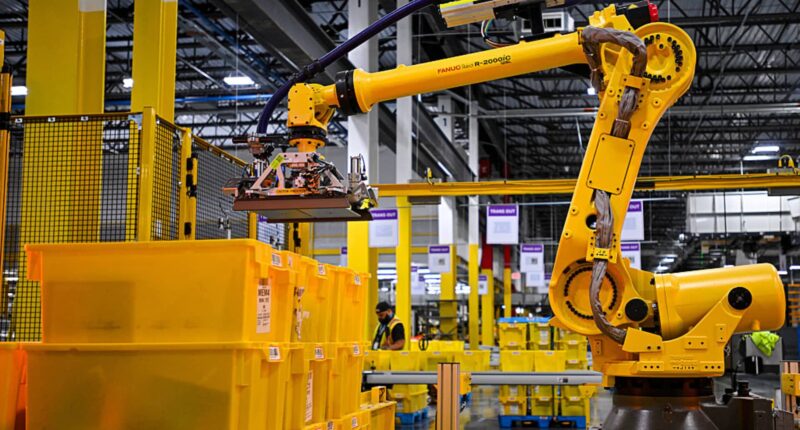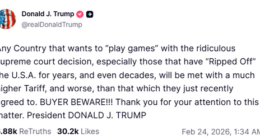Share this @internewscast.com
A Fanuc robotic arm moves bins of products during a media tour of the Amazon.com Inc. DAB2 fulfillment center in Daytona Beach, Florida, US, on Tuesday, Sept. 23, 2025. The DAB2 fulfillment center is Amazon’s seventh robotics fulfillment center in Florida. Photographer: Miguel J. Rodriguez Carrillo/Bloomberg via Getty Images
Bloomberg | Bloomberg | Getty Images
The Trump administration has launched national security investigations into imports of robotics, industrial machinery and medical devices, a move that could pave the way for fresh tariffs and raise costs for consumers, hospitals and manufacturers.
The Department of Commerce said Wednesday that the probes, opened Sept. 2 under the “Section 232” of the Trade Expansion Act, will assess whether such imports threaten U.S. national security, according to Federal Register filings.
The latest probes expand the list of items that could be exposed to higher tariffs to include personal protective equipment such as surgical masks, N95 respirators, gloves and other medical consumables, including syringes, needles and prescription drugs.
They also extend to imported medical equipment such as wheelchairs, hospital beds and diagnostic and treatment devices like pacemakers, insulin pumps and heart valves.
The probes could be used as justification for fresh sectoral tariffs aimed at boosting domestic production of goods deemed critical to national security.
AdvaMed, the trade group that represents medical technology and device makers, stressed in a statement Thursday that 70% of medical products in U.S. hospitals are already “made in America across thousands of manufacturing facilities in all 50 states.”
The group said it would continue to work with the Trump administration, adding, “We believe this process will reinforce the fact that U.S. medtech manufacturing is strong and lower tariffs will fuel more manufacturing and job growth in the U.S., which means greater access to lifesaving technologies and lower costs to American hospitals and patients.”
The Department of Commerce is seeking comments from companies on their projected demand for these products and whether domestic production can meet local demand and the role of foreign supply chains.
Firms are also invited to outline the impact of foreign subsidies and what the administration described as “predatory trade practices.”
The Trump administration has previously invoked Section 232 to impose levies on automobiles and parts, copper, steel and aluminum.
Investigations into imports of pharmaceuticals, semiconductors and chip components such as silicon wafers, chipmaking equipment and related downstream products are also ongoing, reflecting Washington’s concerns over reliance on overseas supply chains.
Any new duties resulting from the sector-specific probes would be stacked on top of U.S. President Doanld Trump’s country-specific tariffs, though the European Union and Japan have reached agreements that could shield them from extra levies.
The U.S. depends heavily on Mexico and China for machinery, with imports from the two countries accounting for more than 18% and 17% of total U.S. machinery purchases in 2023, according to data from the U.S. International Trade Commission.
The auto industry could be among the hardest hit by the latest potential tariffs, as it accounted for the largest demand for industrial robots — 13,747 installations last year, according to the International Federation of Robotics. Most of those robots were imported, with few manufacturers producing in the U.S., the group said.
Culver City, CA – September 23: Detail of vials and syringe containing a COVID-19 vaccination by Pfizer at Kaiser Permanente Venice Medical Office Building in Culver City Tuesday, Sept. 23, 2025. Details of vials, syringes as well as vaccinations.
Allen J. Schaben | Los Angeles Times | Getty Images
The potential levies on medical devices and protective gear could increase costs for hospitals and patients, reducing access to critical equipment and care, experts have warned.
In April, Scott Whitaker, CEO of AdvaMed, warned of the risk of higher costs.
“MedTech supply chain leaders are already reporting supply chain concerns, and we cannot afford to drive up the cost of health care for patients, or on the health care system,” he said at the time. “The reality is, any increased costs will be largely borne by taxpayer-funded health programs like Medicare, Medicaid and the [Veterans Health Administration].”
Hospital trade groups have also been sounding the alarm this year, warning that higher tariffs could hurt the quality of care.
Rick Pollack, the CEO of the American Hospital Association, said in April that “disruptions in the availability of these critical devices — many of which are sourced internationally — have the potential to disrupt patient care.”
— CNBC’s Bertha Coombs contributed to this report.
Correction: This article has been updated to include AdvaMed’s latest statement and clarify the timing of CEO Scott Whitaker’s comments.







